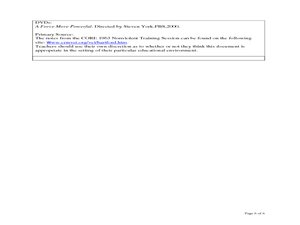Curated OER
Noncombatancy and the Seventh day Adventist Church
Upper graders investigate how the Seventh Day Adventists are objectors to the practice of war. The lesson covers the Civil War and examines the church's position about the practice of war. The research extends to modern wars and learners...
Curated OER
The Unseen Army: Conscientious Objectors During World War II
Learners study World War II and why it was called "the Good War". In this World War II instructional activity young scholars identify the different kinds of conscientious objectors.
Curated OER
Faith in Wartime
Students explore World War II and the people of that era. Numerous activities allow students to examine conscientious objectors; why it was difficult for people to maintain their religious faith while experiencing the horrors of war;...
Curated OER
Arkansas' Reaction to Draft Resistance During World War II
Students identify consequences to the resistance of the draft in Arkansas during World War II. They role-play scripts of local board members who were Southern businessmen, farmers; and conscientious objectors, their friends, families, or...
Curated OER
Conscience and Public Service
Students study conscientious observers (COs) in the Civilian Public Service (CPS) during World War II. They explore how the media sources influence public opinion and policy makers, and complete a writing assignment about the topic.
Curated OER
World War II: Conscription
In this World War II worksheet, students read short passages about conscription, reserved occupations and conscientious objectors.
Curated OER
You and the Military
Do military recruiters plan to visit your campus? If so, the visit presents an opportunity for class members to engage in a series of action projects. Class members interview recruiters, propose a PTA meeting to discuss the pros and cons...
Santa Ana Unified School District
Early American Poets
The poems of Walt Whitman and Emily Dickinson are the focus of a unit that asks readers to consider how an artist's life and changes in society influences his or her work. After careful study of Whitman's and Dickinson's perspectives on...
Stockton University Wordpress
Civil Disobedience: Is it ever ok to break the law?
As part of a study of civil disobedience, class members read excerpts from the writings of activists who were willing to break the law to protest unjust laws.
Curated OER
ON BECOMING A NONVIOLENT WARRIOR
Students examine the concept of non-violent social change. In this lesson on social change, students research and role play to demonstrate ways in which this might be accomplished while making connections to various events in history.
Curated OER
The Screwtape Letters by C.S. Lewis (Letter 7)
In this The Screwtape Letters by C.S. Lewis worksheet, students define ten key vocabulary words using only one or two words and answer nine comprehension questions on letter seven.
Curated OER
Empathy and the Vietnam War
Students explore the implications of the draft during the Vietnam War. In this Vietnam instructional activity, students analyze the lyrics of songs that explore differents opinions of the Vietnam draft. Students particpate in a role-play...
Curated OER
A Parrot's Day in Court
Students research the ethical and legal issues that surround animal rights cases; students use their research to act as expert witnesses at a university hearing on a hypothetical case involving a parrot dissection.
Curated OER
Out of Sight, Out of Mind
Students examine conditions at state mental hospitals after World War II. They examine the treatment of patients and how to evaluate the credibility of sources. They write a short essay to complete the lesson.















